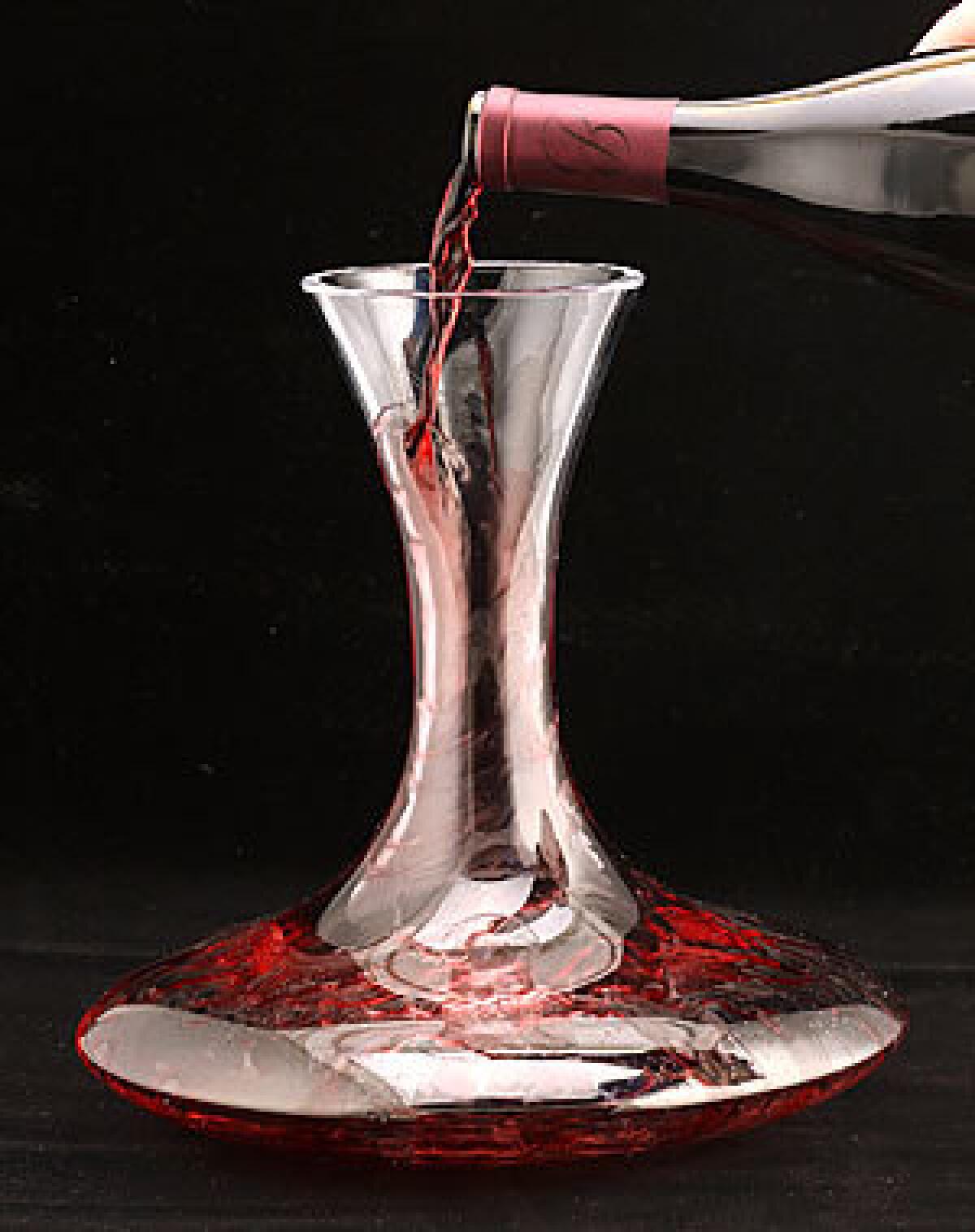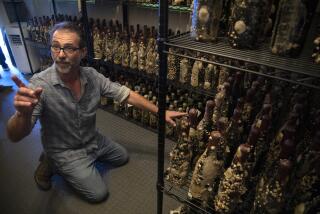Wine decanting: Give wines some air

Air is one of the most talked about but most misunderstood elements in wine.
We say a wine needs to “breathe” as if it just needs a few minutes to freshen itself up, releasing its seductive perfume. In fact, most wines have been waiting years just to cast off a little gas.
In the end, the result is the same: To be appreciated, a wine needs to smell its best. To do that, it needs more air, faster, than you might think -- but not for the reasons you might have heard.
People talk about a wine being “closed,” says Piero Selvaggio, owner of Valentino Restaurant Group. “A closed flower doesn’t give you the pleasure a beautiful rose will give you when it’s in full bloom. You want the petals of the wine, its aromas, to open up and talk to you.”
But poetry aside, to wine researchers, “closed” means nothing. It’s just another metaphor, like saying a wine is “cheeky.”
“The word ‘closed’ does not have a physical meaning for sensory testing,” says Andrew Waterhouse, chairman of the Department of Viticulture and Enology at UC Davis.
Further, Waterhouse says the implication that a “closed” wine is missing something is a misdiagnosis. In fact, rather than withholding scents, the wine is actually giving you something extra: sulfur compounds that are potent enough even in tiny amounts to cover up the fresh fruit aromas you want to smell.
Sulfur occurs naturally in both grapes and the yeasts that turn grapes into wine. Sulfur forms more than 100 compounds called mercaptans. These sulfuric compounds form differently and unpredictably in every bottle of wine.
When exposed to air, they eventually re-form into something less annoying, but they need a few minutes to do so. We call it “breathing,” but it’s really a seething sea of recombining elements.
“I think of wine as a tier of about 100 different compounds that are either taking on oxygen or passing it on to something else,” says Kenneth Fugelsang, associate professor of enology at Cal State Fresno. “When that process is finished, the wine is ready to drink.”
Even if you don’t smell rotting cabbage, asparagus or burnt rubber -- some of mercaptan’s more noxious calling cards -- sulfur compounds are still what keep you from fully enjoying wine right away.
“These reductive compounds are excellent masking agents,” Fugelsang says. “They can hide the positive characteristics of any wine.”
So what should you do to make your wine smell and taste better?
“I believe that every wine should be decanted,” says Maximilian Riedel. No wonder: As heir apparent to the Riedel crystal dynasty, he’s in the business of selling decanters. But that doesn’t make him wrong.
“Decanting is kind of a loaded word,” says Karen MacNeil, faculty chair of the wine department at the Culinary Institute of America’s Greystone campus. “People think they have to have a candle and they have to do it slowly. Unless the wine needs to be removed from its sediment, I like to call [decanting] ‘aerating.’ You don’t need a decanter. You could use a jelly jar.”
Beyond the cork
Pulling the cork doesn’t aerate a wine much because so little of the surface area of the wine is exposed to air. However, pouring out half the bottle -- jelly jar or no -- will do the trick.
“Almost every wine in the world does benefit from aeration,” MacNeil says. “The only exceptions are wines we rarely drink -- older, expensive Burgundies that could collapse with too much air.”
Drew Langley, wine director at Providence restaurant, says, “If a wine can’t stand up to decanting, it can’t stand up to drinking. I decant a lot of white wines here, especially wines that are oaked. Once you decant the wines, they become much more aromatic and expressive.”
In fact, with young red wines, Langley double-decants: He pours from the bottle into one decanter, then another, to get the wine as much air as quickly as possible.
Otherwise, “if it’s a large group of people, the wine gets consumed so fast that it doesn’t have time to open up,” Langley says.
In pursuit of greater airflow, Carlsbad’s Rio Sabadicci invented the Vinturi, essentially a fancy funnel that sucks in extra air. The Vinturi is popular in tasting rooms and is used in the dining room at Charlie Palmer’s at Bloomingdales South Coast Plaza in Costa Mesa.
A German glass company, Eisch, claims its glasses are treated with “oxygen waves” that make them “breathable,” so that wine poured into them is fully aerated in two to four minutes.
The Culinary Institute of America uses the Eisch glass, but MacNeil says she doesn’t fully understand how it works. She does, however, like the Eisch glass’ durability.
Riedel goes even further; the Austrian company would like you to buy different glassware for each varietal. Maximilian Riedel claims that specific designs enhance the aromas of each.
Waterhouse says glass design does have an effect, but mainly because of the size of the opening. A larger opening allows more aroma-laden air to accumulate above the wine.
“You have to let it sit for a few minutes to let the aroma in the liquid evaporate into the head space,” Waterhouse says.
MacNeil says there might be subtle differences from glassware shape, but when she goes out for a meal, she keeps it simple: Bigger is better.
“Whenever I’m in a restaurant, I almost always ask for a bigger glass,” MacNeil says, although that doesn’t apply to fortified wines or spirits because the larger opening concentrates the raw alcohol too much.
Waterhouse points out that air is only a good thing for a while. Eventually, it will break down the wine’s perfume. For wines with interesting secondary characteristics, like most reds, this won’t happen for two or three days. But for others, it can happen much more quickly. Once a simple white wine loses its fresh fruit, it has nothing else to offer.
That’s why if you don’t finish a wine right away, you should spray a neutral gas like Private Preserve into the bottle and recork it to slow the oxidizing process.
As with many aspects of wine, there may be a psychological element as well: If you think a wine tastes better after decanting, or in a special glass, then it will.
Susan Rodriguez, a research fellow at Cal State Fresno, recently did a blind tasting experiment and discovered that her panel could not tell the difference between a wine that had been decanted for two hours and the same wine right out of the bottle.
“The people who set it up were flabbergasted,” Rodriguez says. “They were sure they could taste a difference.”
More to Read
Eat your way across L.A.
Get our weekly Tasting Notes newsletter for reviews, news and more.
You may occasionally receive promotional content from the Los Angeles Times.










